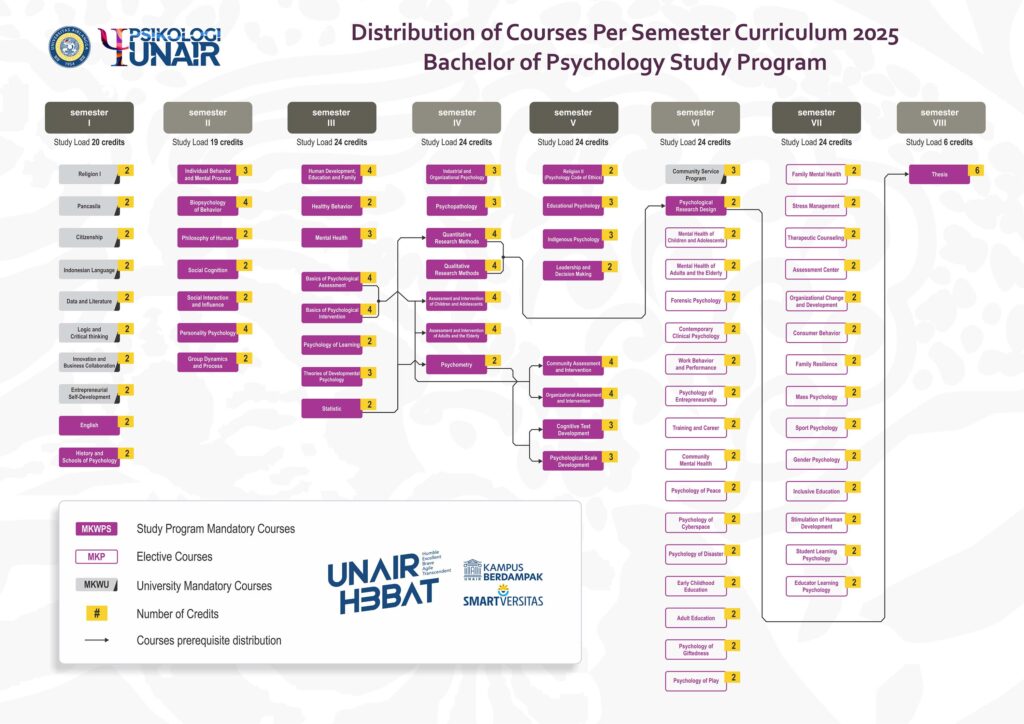Accreditation
UNGGUL (EXCELLENT)
Intake Period
Annually
Duration
8 semesters (144 credits)
Courses
Fulltime
Lectures
On campus
Open House 2025 – Undergraduate Program & IUP
Admission Informations: PPMB UNAIR Website – Seleksi Mandiri Undergraduate Program
PROFILE
The Undergraduate Psychology Study Program was established in 1981 based on Rector's Decree No. 076/PT.03.B/08/1981. This program was established in response to the public's need for psychology services, both within the general public and in industry. The program's development was supported by the growing popularity of psychology in the community and the growing demand for graduates in the workforce.
The program's curriculum utilizes the Outcome-Based Education (OBE) approach. In Indonesia, the Undergraduate Psychology Study Program is one of two study programs to receive superior accreditation. Furthermore, the program has received international accreditation from FIBAA and AUN-QA certification.
VISION
To become an independent, innovative, and leading Faculty of Psychology at the national and international levels, a pioneer in the development of psychology-based science and technology based on religious morality.
MISSION
- To provide academic and professional education in psychology based on modern learning methods.
- To conduct innovative basic and applied research in psychology to support educational development and community service.
- To dedicate expertise in psychology to the community.
- To strive for independence in the implementation of the Tri Dharma of Higher Education through the development of modern management institutions oriented towards quality and competitiveness.
OBJECTIVES
- To produce quality graduates who are able to develop themselves to compete at the national and international levels based on religious morals.
- To produce innovative research that promotes the development of science.
- To provide community service through the study and development of applied psychology that benefits the welfare of humanity.
- To participate in realizing the independence of Airlangga University, which is adaptive, creative, and proactive in responding to the demands of strategic environmental developments.
CURRICULUM STRUCTURE

INTERNATIONAL CLASS
- Academic Mobility Exchange for Undergraduate at Airlangga (AMERTA). Bachelor of Psychology Programme offers some courses for international class centrally managed by Universitas Airlangga.
- Inbound-outbond student mobility UNAIR-UUM. Bachelor of Psychology programme and School of Applied Psychology, Social Work, and Policy, Universiti Utara (Malaysia) organizes student exchange from both programme, where students from each one will study for one semester in the partner-institution with a credit transfer system.
- 2+2 Articulation Program (collaboration with QUT, Australia). This programme is a collaboration between Bachelor of Psychology programme with School of Psychology and Counselling, Queensland University of Technology (Australia) which offers double degree. Students will spend their first two years in UNAIR and the next two years in QUT.
LEARNING FORMS
Learning activities are divided into two semesters. The odd semester generally runs from August to January, while the even semester generally runs from February to July. The minimum number of meetings per semester is 14 lectures, which can include various learning strategies, such as lectures, seminars, group discussions, labs, fieldwork, research, and so on.
CLASS SCHEDULE
Students can access the class schedule through their respective accounts on the Universitas Airlangga Cyber Campus (UACC).
GRADUATES' DEGREES
Graduates of the regular Bachelor of Psychology program will receive a Bachelor of Psychology (S.Psi.). Graduates of the international double degree program (IUP Articulation Program) will receive a Bachelor of Psychology and a Bachelor of Behavioral Science (Psychology) from QUT, or a Bachelor of Science (Psychology) from Curtin University, or a Bachelor of Science in Psychology from the University of Leeds.
STUDENT ORGANIZATIONS
The Psychology Undergraduate Program provides students with opportunities to develop soft skills and leadership potential through various student organizations (ormawa): BEM (Student Executive Board), BLM (Student Legislative Body), and BSO (Semi-Autonomous Body). Student organization activities are planned by the management, supervised by a student affairs advisor, and reported regularly to the faculty leadership.
INTERNSHIP
Internships are also available for students at national or multinational companies that collaborate with the faculty, such as Airlangga Psych Internship (API).
STUDENT OUTBOUND PROGRAM
International activities in collaboration with global university partners.
Follow news about student activities on the Student Activities page.
SCHOLARSHIPS
A number of scholarships are offered to students, most of which are centrally managed by Airlangga University. Scholarships are awarded to students who meet the stated requirements. Scholarships centrally managed by UNAIR include:
- University Entrance Scholarship (BMU),
- BUMN Peduli Pendidikan (State-Owned Enterprises Care for Education),
- Bidik Misi (Mission Scholarship)
- Academic Achievement Improvement (PPA),
- Student Learning Assistance (BBM),
- Extracurricular Achievement Improvement (PPE),
- Djarum Bakti Pendidikan (Education Service),
- Bank Mayapada (Mayapada Bank),
- Bank Eka Cipta (Education Service),
- Semen Gresik (Semen Gresik),
- Indocement Tunggal Prakarsa (Indocement Tunggal Prakarsa),
- Pertamina Yekape (Ekape),
- Supersemar (Supersemar),
- BCA Bakti (BCA),
- Damandiri (Education Bank),
- Bank Rakyat Indonesia (Bank Rakyat Indonesia),
- PT Gas Negara (State-Owned Enterprises),
- Marga Jaya (Marga Jaya),
- Indocement (Indocement), and others.
The Airlangga University Psychology Alumni Association (APSILANGGA) also provides student loans for outstanding students in need based on a priority scheme.
